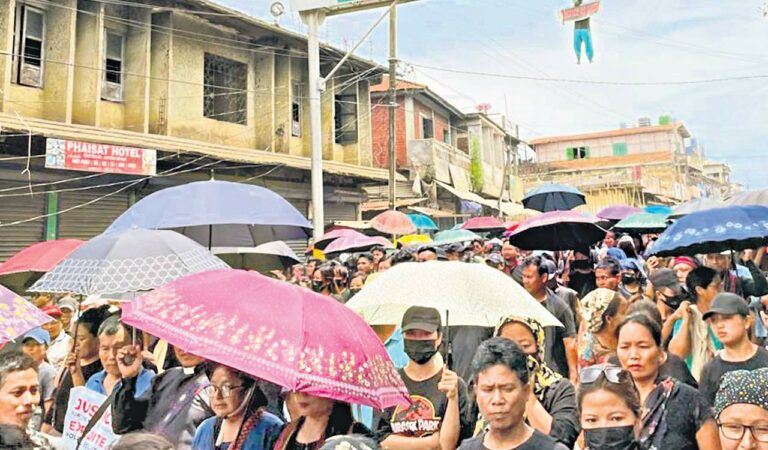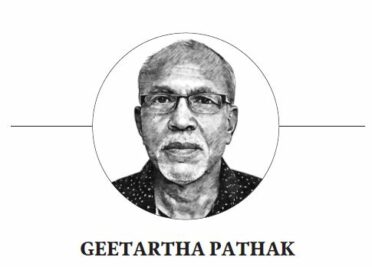
By Geetartha Pathak
The Prime Minister’s enigmatic silence on the Manipur conflict and its handling by both the State and the central government has aggravated the situation rather than finding an immediate solution. The Centre held a high-level meeting in Delhi only after fresh violence escalated tensions in Jiribam, a border district known to have maintained relative peace throughout the year-long violence.
Home Minister Amit Shah said after holding the meeting to review the security situation in Manipur that the government would work to bridge the ethnic divide between Meitei and the Kuki Zo groups. However, what the State government has done since the conflict began in May last is aggravating the situation by forgetting the Raj Dharma. The Home Minister has not disclosed any roadmap for bridging the ethnic divide.
Mum Government
The new Tribal Affairs Minister Jual Oram has broken the silence and termed the year-long ethnic conflict in Manipur as a simple “law and order situation” which is being dealt with by the Ministry of Home Affairs. Oram said the problem is being handled by the Home Ministry, in coordination with the State government and the Governor, and hence it would not be prudent to comment on the issue without delving into the specifics. Former Tribal Affairs Minister Arjun Munda had maintained a silence since the conflict between two ethnic groups started and refused to answer questions on the problem.
The conflict in Manipur began on May 3, 2023, after a State-wide protest march was held by all tribal communities, including Kuki Zo and Naga tribes of the State, against an order of the Manipur High Court that directed the State government to consider the inclusion of the Meitei community in the Scheduled Tribes list. In February this year, the Manipur HC ordered the removal of a paragraph advocating for Meitei inclusion in the Scheduled Tribe list due to conflict with Supreme Court precedent. The court ruling emphasises adherence to government procedure. The Supreme Court denounces the directive as “obnoxious” amid legal challenges. The HC highlighted the necessity for alignment with the Supreme Court’s constitutional interpretation for amendments to the Scheduled Tribe list as detailed in the Ministry of Tribal Affairs’ 2013-14 report.
The Congress bagging both the Lok Sabha seats of Manipur is a clear indicator of the mood of the people
Many representations have been sent to the office of the Tribal Affairs Minister from members of both communities. The Kuki-Zo people had written to the Minister seeking his intervention to protect them and defend the rights of their community. On the other hand, representatives of the Meitei community have written to the Minister asking for revoking the ST status of some Kuki-Zo tribes. Therefore, the Tribal Affairs Ministry cannot absolve itself of its responsibility and push it to the Home Ministry terming the unrest merely a law-and-order situation.
Elusive Peace
On the other, it would be unfortunate if the Tribal Affairs Minister could not delve into the specifics of the problem even after more than one year of the conflict. The Indigenous Tribal Leaders Forum (ITLF), a Churachandpur-based Kuki-Zo civil society organisation, reacted to the remark of Oram. The ITLF said the minister was misinformed for thinking that the ethnic conflict in Manipur is a simple law and order situation.
Undoing the Manipur HC’s order by the same court has failed to bring back peace in the border State as the widening gap between the two communities was placed elsewhere. The HC order was the immediate trigger, decades-long differences led to a deeper ethnic divide between the two communities.
While Meiteis comprise 51% of Manipur’s population, they hold only 10% of the land in the State. The Kukis and Nagas, who comprise 40% of the population, occupy 90% of the land. Hence, Meiteis have a larger share of representation in the legislative Assembly and control the government and the economy of the State which encouraged their majoritarianism. The underrepresented Kukis in sociopolitical settings feel marginalised. Minority communities, including Kuki and Naga, have always raised allegations that the bulk of the State’s budget for development work was focused on the Meitei-dominated Imphal valley.
Demographic Shift
The higher decadal growth rate of the population in the hills, particularly among the Kukis, compared to the valley has raised suspicions that people are illegally migrating from neighbouring countries predominantly from Myanmar. The rapid population growth among the Kukis is often attributed to the large-scale migration from Myanmar as the Kuki community is spread over the borders of both sides of the two countries.
The perceived demographic shift and an increase in the population of non-indigenous communities have led to concerns about Meitei marginalisation in Manipur. It is comparable with the problem of foreign nationals in Assam where the indigenous Assamese people feared marginalisation. In 1980, the Assam agitation was triggered after noticing abnormal growth in Muslim voters in the Mangaldoi constituency byelection in 1979. A study shows that high population growth is attributed mainly to poverty, underdevelopment, lack of education healthcare etc. The trend is that economically and socially marginalised groups have more children.
Prime Minister Modi referred to Muslims as “infiltrators” and “those who have more children” in Baswara of Rajasthan on April 21. The narrative that the Muslims are digging into the resources of the country by raising more children is misleading. The census data reveals that the population growth in North India is far higher than in the South. Since the Muslim population in India is less than 15%, the higher growth of the population in the North cannot be attributed to the Muslims only. As the delimitations of constituencies are due, North India will get more constituencies for high population growth and ultimately control the political power of the country. It is like rewarding the North for more population and punishing the South for abiding by the population control policy of the government.
Since Meiteis are dominantly Hindu and Kukis are Christian, and the Hindu nationalist party is at the centre of power both at the State and the Centre, consequently, the State which is predominantly controlled by the Meiteis took sides with the majority. The involvement of the armed militants on both sides has worsened the situation. Now all the communities, including Meiteis, Kukis and Nagas, blame the Biren Singh-led ruling BJP State government for the Manipur violence. If the government thinks that the Manipur conflict is a simple law and order situation, it cannot arrive at a solution. The Congress bagging both the Lok Sabha seats of Manipur even after the polling booth was captured by Meitei militants is a clear indicator of the mood of the people. They want normalcy to return in the State.

(The author is a senior journalist from Assam)

 2 days ago
2 days ago
















 English (US) ·
English (US) ·